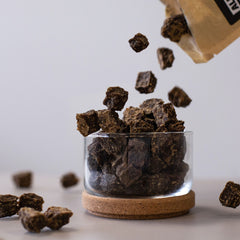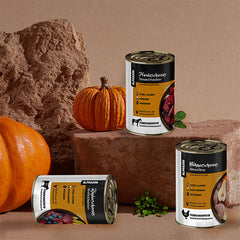Corn for dogs: healthy or better to avoid?
Corn is a popular food and can be found in many dishes—but what about dogs? Can dogs eat corn? The answer is yes, but it depends on how you prepare the corn and the quantities you feed it. In this blog, you'll learn everything about corn for dogs: from its health benefits and potential risks to tips for safe feeding.
Can dogs eat corn? The short answer
Yes, dogs can eat corn as long as it's prepared properly. Corn is non-toxic and can be a valuable source of energy for your dog. However, it's important to pay attention to the correct preparation and quantity, as not all corn products are suitable for dogs.
What is allowed?
- Cooked corn kernels without salt, butter or spices.
- Corn as a component of high-quality dog food.
What is forbidden?
- Corn cobs (choking hazard).
- Processed corn products such as popcorn with sugar, salt or butter.
The benefits of corn for dogs
Corn is a versatile ingredient that can offer your dog many health benefits. Here are the most important ones:
1. Energy source
- Corn contains carbohydrates that provide your dog with quick energy.
2. Rich in fiber
- Supports digestion and promotes healthy intestinal flora.
3. Vitamins and minerals
- Vitamin B: Promotes the function of the nervous system and metabolism.
- Magnesium: Supports muscle function.
- Antioxidants: Protect your dog’s cells from free radicals.
4. Low in calories
- Corn is relatively low in calories and therefore a good alternative to fatty snacks.
5. Gluten-free
- For dogs with gluten intolerance, corn is a safe option.
How much corn can dogs eat?
The right amount is crucial to reap the benefits of corn without harming your dog.
Recommended amount:
- Small dogs: 1–2 tablespoons of corn per week.
- Medium-sized dogs: 3–4 tablespoons of corn per week.
- Large dogs: Up to 1/2 cup of corn per week.
Risks and precautions for maize
While corn can be healthy, there are some risks you should be aware of:
1. Danger of suffocation from the corn cob
- Corn cobs are hard and can cause intestinal blockages if your dog chews or swallows them.
2. Processed corn products
- Popcorn with sugar, salt, butter or other additives is unsuitable for dogs and can be harmful to their health.
3. Allergies
- Some dogs may be allergic to corn. Watch for symptoms such as itching, diarrhea, or vomiting.
4. Overfeeding
- Too much corn can cause digestive problems such as bloating or diarrhea.
5. Sugar in corn
- Corn contains natural sugars, so it's only suitable in small amounts for dogs with diabetes.
How do you properly feed corn to your dog?
To ensure corn is safe and healthy for your dog, you should prepare it properly. Here are some tips:
1. Remove corn kernels from the cob
- Remove the corn kernels completely from the cob to avoid the risk of suffocation.
2. Cooked and natural
- Cook the corn without salt, butter, or spices.
3. Offer in small quantities
- Start with a small amount to ensure your dog tolerates the corn well.
4. Prefer fresh corn kernels
- Fresh corn is better than canned corn, as it often contains sugar or salt.
5. No corn as the main feed
- Corn should only be fed as an occasional supplement and not as a main part of the diet.
Creative ways to prepare corn for dogs
Corn can be served in a variety of ways to offer your dog a tasty change. Here are some ideas:
1. Boiled corn as a snack
- Cook the corn kernels and serve them plain as a snack.
2. Corn in the main feed
- Mix cooked corn into your dog's food to add variety.
3. Homemade dog treats
- Combine corn flour with oatmeal and egg, form small cookies and bake them in the oven.
4. Corn smoothie
- Puree cooked corn kernels with some unsalted vegetables like carrots and serve it as a special treat.
When should you not give your dog corn?
In some cases, corn is not suitable for dogs:
1. Allergies
- If your dog has already had allergic reactions to other grains, corn could also be problematic.
2. Diabetes
- Because of the natural sugar, dogs with diabetes should only eat small amounts of corn.
3. Digestive problems
- Dogs with sensitive stomachs may react to corn with flatulence or diarrhea.
4. Obesity
- Because of the carbohydrates it contains, corn is not ideal for overweight dogs.
Frequently asked questions about corn for dogs
“Can puppies eat corn?”
Yes, puppies can eat corn, but only in small amounts and well cooked.
“Is corn poisonous to dogs?”
No, corn is not poisonous as long as it is prepared properly and fed in moderation.
“Can dogs eat popcorn?”
Only unsalted and unsweetened popcorn is suitable for dogs, but even then only in small quantities.
“What alternatives are there to corn?”
Potatoes, sweet potatoes or rice are also healthy alternatives for dogs.
Conclusion: Corn for dogs – healthy, but with caution
Corn can be a healthy and delicious addition to your dog's diet when prepared properly and fed in small amounts. Key points at a glance:
- Safe: Cooked corn kernels without salt, butter or spices.
- Benefits: Source of energy, fiber and vitamins.
- Caution: No corn cobs or processed corn products.
With these tips, you can safely and confidently offer your dog corn. It's not only healthy, but also a varied addition to your four-legged friend's diet!
















